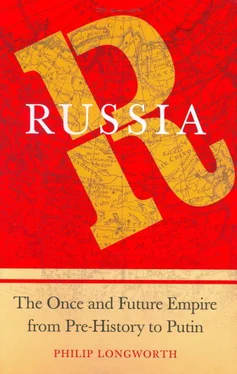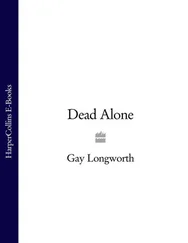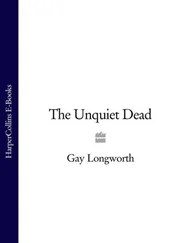All these contrasts were represented in Siberia. On the banks of the great river Ob, upriver from the ancient city of Tomsk, lies Akademgorodok -as its name suggests, a town founded for the specific purpose of serving the most sophisticated scientific research. Siberia was a land of great riches as well as tundra desolation: of diamonds, gold and oil, and great hydroelectric schemes, as on the Yenisei and Angara rivers, models for famous ‘Third World’ projects like the Aswan Dam. But Siberia was also home to peoples who, for all the ministrations of tsarist missionaries and earnest Communist educators, had hardly advanced from the Stone Age in material culture or understanding of the modern world. Although the processes of adjustment and absorption usually proceeded quietly, there were occasions when the two worlds clashed. There was the occasional squalid fight in dreary Siberian towns between drunken natives and Russian louts yelling racist abuse, and one fracas in Yakutsk was serious enough to bring troops out on to the streets. Nor were well-meaning attempts to inform native peoples always welcomed by them. ‘“What is the October Revolution?” Evenk reindeer-herders had plaintively enquired, “Who are the bourgeois elements? What is technology? What is industry?”‘ When a community of Chukchi were invited to elect a committee they resisted on the reasonable ground that ‘if they elected one, the number of walrus would not increase.’ 33It was native practicality rather than innocence which spoke. Soviet values did not resonate with Chukchi mentality.
Despite rumblings of discontent in one or two COMECON countries, the Soviet Empire in 1980 seemed stable and reasonably successful. The Soviet Union itself had not caught up with the United States in terms of economic output as Khrushchev had boasted, but it was incontestably a world power, its peoples more prosperous and freer than in the 1950s. True, the Communist movement was no longer a dynamic force in the world, but Moscow was still a beacon of hope for poorer countries, and also for some less poor that wished to distance themselves from American culture and the embraces of capitalism. Even though the system had not yet quite succeeded in replacing nationalism with a supranational Marxist faith, no informed observer seriously expected the vast and powerful Soviet fortress, with its huge outworks of control and influence spreading halfway round the world, to suffer any marked decline in the foreseeable future. Yet within a dozen years, as if subjected to some potent combination of strange chemical forces, it simply evaporated. The fourth, and greatest, Russian Empire was gone, never to be resurrected.
14
Autopsy on a Deceased Empire
AT MIDNIGHT ON 31 December 1991 the Soviet Union ceased to exist. The satellite states had gone their separate ways two years earlier, but now the Baltic states regained their independence and Ukraine, Belarus, Kazakhstan and all the other constituent republics started out on a new existence as sovereign states. The red flag with the hammer and sickle was run down the Kremlin flagstaff, and a blue, red and white tricolour was run up instead. Russia had again been shorn of empire.
The reasons why the Soviet Empire collapsed have been disputed ever since. Many believed that dissident activity and popular protest had brought the regime down. Others argued that President Reagan’s Strategic Defense Initiative — otherwise known as ‘Star Wars’ — had established an unchallengeable American superiority in the arms race, and that this had forced the Kremlin to admit defeat and wind its empire down. Some who resented the passing of the old regime explained its fall in terms of conspiracy theories; economists attributed it to industrial obsolescence, political scientists to advances in computer technology which made it impossible for the regime to control the dissemination of information. Other theorists ascribed the collapse to the rigidity of Soviet institutions and their inability adapt to new conditions. (However, it seemed odd that none of the experts who explained the inevitability of Communism’s collapse had actually predicted it.)
Then there were those who said that it was the reform of the Soviet system itself which had precipitated the trouble. They held Mikhail Gorbachev, the last General Secretary of the Communist Party of the Soviet Union, responsible for a situation that a less reckless leader would have avoided. And there were some who attributed the collapse simply to ill-fortune (or act of God), to a remarkable series of unforeseeable, uncontrollable and damaging events. Each of these explanations contains some truth. None has so far gained universal acceptance among the ranks of the informed. To gain a fuller understanding of the processes involved we should retrace our steps to the mid-1970s, the high point of Soviet fortunes. As late as the 1970s and even in the 1980s there was no obvious indication of impending disaster. Indeed, the auguries read well. The Soviet Union was as mighty in weaponry as its only rival; surprising as it may seem, its population was as contented as that of the United States; and there was hardly a ripple of dissidence or nationalism anywhere in the Empire. Its policy on nationalities since the 1920s had provided institutional recognition of ethnic nationalism, and since the Second World War a credible ‘Soviet nationalism’ had emerged. The sense of solidarity had been reinforced by millions of marriages between partners of different nationality. Furthermore, since Brezhnev had given non-Russian nationalities primacy in the constituent republics, 1it could no longer be argued that one had to be Russian to have a good career.
A survey carried out in 1976 found that most Russians rated their material life at as high as four points on a scale of one to five. There was, after all, no hunger, unemployment or homelessness. Standards of medical care and public order were high, and of education very high. There were shortages, and goods were often shoddy — but that had always been the case. There was a virtual absence of luxury as it was known in the West, but there was welfare at public expense for the young, the old, the sick and the disabled. Rather more Russians than Americans were satisfied with the amount of free time their work allowed them, and more Russians than Americans enjoyed both their work and their leisure. Russians might hate their local bureaucrats, but, as a leading opinion researcher (who was no friend of the regime) has concluded, most people ‘accepted the political, economic and social order, including official values such as patriotism, collectivism, respect for the Army, the Soviet empire, national solidarity and the Communist Party. Russians steadfastly supported Soviet foreign policy, including the invasions of Hungary, Czechoslovakia and Afghanistan.’ 2Dissidents existed, but they were few, and their voices were muted by media control, warnings, imprisonment or, as in the case of the novelist Solzhenitsyn, exile in the West. Nationalists hardly stirred, and there was no sign of serious discontent.
Nor was there much restiveness in the countries of the Soviet Bloc. In 1976 a dissident playwright called Vaclav Havel was among a number of Czech intellectuals who issued ‘Charter 77’ in January that year. This petition invoked the new International Covenant of Rights to protest against the prosecution of a pop group called Plastic People of the Universe, which had infringed the government’s canons of decency In retrospect this might seem a significant blow for freedom, but it was no threat to the regime. Nor were some violent strikes by miners in Romania. Even the election of the Cardinal Archbishop of Cracow, a long-standing thorn in the side of the Polish government, to the papal throne in October 1978 caused hardly a ruffle in the Kremlin dovecotes. Rome would be less of a restraining influence on the Polish Church, reported the Soviet ambassador to Warsaw somewhat blandly, but the election would deprive ‘the reactionary part of the episcopate… of its leader’. 3
Читать дальше





![Stephan Orth - Behind Putin's Curtain - Friendships and Misadventures Inside Russia [aka Couchsurfing in Russia]](/books/415210/stephan-orth-behind-putin-s-curtain-friendships-a-thumb.webp)





